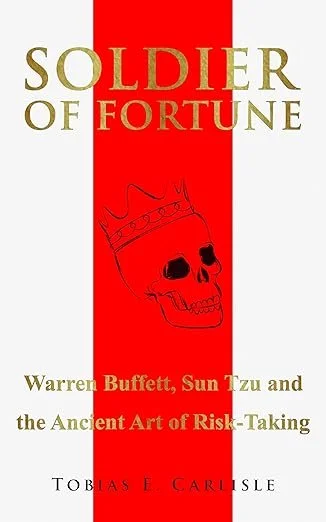Soldier of Fortune
I listen to The Acquirers Podcast, hosted by Tobias Carlisle on a weekly basis, so when he announced he had a new book coming out, I was happy to check it out. He’d already discussed its core thesis on his own show as well as in a We Study Billionaires interview, but even with that preview, I underestimated just how much of a valuable read Soldier of Fortune would turn out to be.
At first glance, comparing Warren Buffett and Sun Tzu might seem like an odd pairing. Yet if you’re familiar with The Art of War and with Buffett’s investment philosophy, the connection makes a lot of sense. In just 140 pages, Carlisle manages to draw insightful parallels between the two and as self-professed deep value investor he knocks it out of the park with the value delivered in this one.
Each chapter aligns key lessons from The Art of War with pivotal moments, investments and decisions in Buffett’s tenure as CEO at Berkshire Hathaway. The result is both a strategic and practical look at how the timeless principles of patience, discipline, and careful risk management can be applied to long-term investing. What the reader gets from this approach is both excellent insight into some of Buffett’s key investments but also why they were both hiding in plain sight yet excellently executed at the same time. It’s almost simple yet profound to take in the effectiveness of Buffett’s investment philosophy over the decades.
By the end, I found myself thinking that Soldier of Fortune pairs perfectly with Nick and Zak’s Adventures in Capitalism. Both books reinforce the same fundamental lesson, the power of patience and disciplined risk management in compounding wealth over time. In a world obsessed with leverage, speculation, and short-term gains, these books stand as reminders that the slow, steady path remains one of the most reliable routes to lasting success.
Buffett hardly needs further praise as his record speaks for itself but Carlisle deserves credit for bringing a novel approach to looking back on Buffett’s investment career. By merging military strategy with investment wisdom, he’s created a refreshing and thought-provoking take on Buffett’s philosophy.
Who’s it for?
Fans of Buffett will enjoy this with a unique lens on his investment philosophy. It’s also a great read for anyone interested in strategic thinking, value investing, or risk management. For those unfamiliar with The Art of War, this book also serves as a good primer to its principles, showing just how relevant they remain in the modern financial world.

